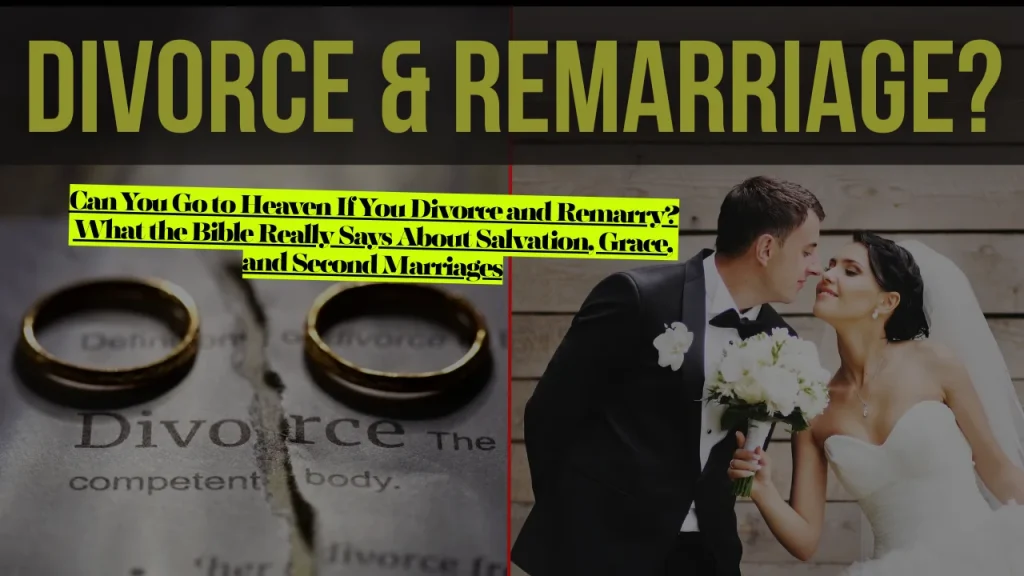Can You Go to Heaven If You Divorce and Remarry? What the Bible Really Says About Salvation, Grace, and Second Marriages
Yes, you can go to heaven if you divorce and remarry. According to mainstream Christian theology, salvation comes through faith in Jesus Christ and God’s grace, not through marital perfection (Ephesians 2:8-9). Your eternal standing depends on accepting Christ’s sacrifice for sin, not on maintaining an unblemished marital record.
The core question isn’t whether divorce or remarriage bars you from heaven—it’s whether you’ve placed your faith in Christ for forgiveness. No sin, including divorce and remarriage, can undo the work of Christ for those who are born again. God’s grace covers all sin when you repent and believe.
What Does the Bible Say About Divorce and Salvation?
Scripture addresses marriage permanence but separates this from the question of eternal salvation. According to Matthew 19:6, “So they are no longer two but one flesh. What therefore God has joined together, let not man separate.” God designed marriage as lifelong, yet Scripture acknowledges that sin causes marriages to fail.
Jesus pointed out that divorce laws were given “because of the hardness of people’s hearts, not because such laws were God’s desire” (Matthew 19:8). This distinction matters: God hates divorce because it violates His design, but divorce itself doesn’t constitute an unforgivable sin that prevents salvation.
The biblical rule states clearly in 1 Corinthians 7:10-11: “To the married I give this command (not I, but the Lord): A wife must not separate from her husband. But if she does, she must remain unmarried or else be reconciled to her husband. And a husband must not divorce his wife.”

What Did Jesus Teach About Divorce and Remarriage?
Jesus addressed divorce directly in multiple Gospel accounts. In Matthew 19:3-12 and Mark 10:2-12, Jesus confronted the Pharisees’ question about whether divorce was lawful “for any cause”. His response elevated God’s original marriage design above Moses’ accommodations.
Jesus provided an exception: “Except for sexual immorality” in Matthew 5:32 and 19:9. The Greek word porneia encompasses adultery, sexual sin, and marital unfaithfulness. When this exception applies, the innocent spouse may pursue divorce without violating God’s commands.
Paul adds another biblical ground in 1 Corinthians 7:15: when an unbelieving spouse abandons the marriage, “the believing husband or wife is no longer bound to the other”. This “Pauline privilege” recognizes that an unbeliever’s desertion releases the faithful partner.
How Do Different Christian Denominations View This?
Catholic Church
The Catholic Church treats all consummated sacramental marriages as permanent during the life of the spouses, and therefore does not allow remarriage after a divorce if the other spouse still lives and the marriage has not been annulled. Annulment declares a marriage invalid from its beginning, distinct from divorce.
While the Catholic Church stands opposed to divorce, some confusion exists about whether divorced and remarried Catholics can receive communion. The actual teaching is more nuanced than the common claim that they are in a “state of mortal sin”.
Eastern Orthodox Churches
The Eastern Orthodox Churches recognize that there are occasions when couples should separate, and permit remarriage in Church, though its ‘ecclesiastical divorce’ rules are stricter than civil divorce in most countries. They view marriage as indissoluble ideally, but allow pastoral accommodation.
While the Orthodox Church stands opposed to divorce, in its concern for the salvation of its people, it does permit divorced individuals to marry a second and even a third time. This practice of economia represents pastoral mercy rather than endorsement.
According to Orthodox theology, economia means “the suspension of the absolute and strict applications of canon and church regulations without compromising dogmatic limitations”. The second marriage ceremony includes penitential elements acknowledging the brokenness of divorce.

Protestant Churches
Protestant denominations vary significantly in their divorce and remarriage positions. Many Protestant churches discourage divorce though the way divorce is addressed varies by denomination; the United Church of Christ permits divorce and allows for the possibility of remarriage, while denominations such as the Mennonite Christian Fellowship teach the sinfulness of remarriage following divorce.
The mainstream evangelical view (as reflected in chapter 24 of the Westminster Confession of Faith) teaches that while divorce always violates God’s ideal, He provides protection and an exception for a spouse whose partner has heinously violated the marriage covenant.
Is Divorce an Unforgivable Sin?
No. Every divorce is a result of sin, either on the part of one spouse or both. Does God forgive divorce? Absolutely! Divorce is no less forgivable than any other sin. Forgiveness of all sins is available through faith in Jesus Christ (Matthew 26:28; Ephesians 1:7).
The question of remarriage after divorce is not an eternal issue for the born again believer but a question of present sanctification or purity. Your salvation status doesn’t hinge on your marital history but on Christ’s finished work on the cross.
The only unforgivable sin mentioned in Scripture is blasphemy against the Holy Spirit (Matthew 12:31-32)—persistently rejecting God’s grace. Divorce and remarriage, when confessed and covered by Christ’s blood, receive the same forgiveness as any other sin.
What Role Does Repentance Play?
Genuine repentance remains essential for anyone seeking God’s forgiveness. The apostle Paul stated in 2 Corinthians 7:10, “For the sorrow that is according to the will of God produces a repentance without regret, leading to salvation, but the sorrow of the world produces death”. True repentance grieves the sin itself, not merely its consequences.
If repentance from an unbiblical divorce is genuine, the true fruits of that repentance would be to seek reconciliation with the former husband (Matthew 5:23-24). However, when reconciliation becomes impossible—if the former spouse remarries, proves to be an unbeliever, or dies—the repentant person faces different circumstances.
Some demand repentance based on Law, requiring restitution and punishment like celibacy or dissolved marriages. Others argue that no dissolution of marriage or forced celibacy are necessary since the person becoming a Christian or the Christian being restored are both receiving forgiveness for all of their sins (including the sin of divorce) made possible by the grace of God.
What If You Remarried Without Biblical Grounds?
This scenario troubles many believers. If someone remarries after an unbiblical divorce, they should first acknowledge that their remarriage was sin. They forsook their first spouse and mocked the one-flesh union by joining sexually to another (1 Corinthians 6:15-20).
Yet, given that they cannot return to the first spouse, they also cannot dissolve the present union, since this would add an additional broken covenant. Breaking a second marriage vow compounds the sin rather than fixing the first error.
If Jesus is willing to call wrongfully entered relationships marriages, then we should hold people to the expectations of holiness and permanence implied in the word marriage, till death do us part. The path forward involves confession, repentance to God and former spouse, and then honoring the current marriage covenant.
The couple should acknowledge the power of the gospel of Jesus Christ in cleansing even sinful arrangements. Having repented of the sin, bringing this sin up again and again for the rest of their lives would put harmful pressure on the marriage as well as their sense of being forgiven.
How Does God’s Grace Apply to Divorce?
God’s grace operates as undeserved favor. Grace is not earned by any effort on our part; otherwise, it could not be called grace. Grace is free. If our good works earned salvation, then God would be obligated to pay us our due. This principle extends to divorce and remarriage.
To think that remarriage will put eternal salvation at risk undermines the completed work of Christ on the cross and makes salvation dependent on theological and legal performance. While striving for correct theology matters, salvation doesn’t depend on perfect doctrinal understanding of complex marriage scenarios.
Throughout Scripture, we are given so many promises to show us that there is always hope! Romans 8:28 tells us that all things work together for the good of those who love God. Even broken marriages can become part of God’s redemptive story when surrendered to Him.
Consider biblical examples: The lineage of Christ recorded in Matthew 1 lists a prostitute (Rahab, who eventually married Salmon), an adulterous couple (David, who married Bathsheba after having her husband murdered), and a widow (who married her kinsman-redeemer, Boaz). God’s grace weaves redemption through imperfect marital histories.
What About Specific Bible Verses on Divorce?
Matthew 5:32
Jesus says in Matthew 5:32, “Except for sexual immorality,” possibly giving God’s permission for divorce and remarriage. The assumption is that the woman who is divorced will remarry, and Jesus seems to say that, unless her first marriage was dissolved by adultery (on her husband’s part), her second marriage will make her an adulteress.
Matthew 19:9
This verse contains the same “exception clause” as Matthew 5:32, specifically addressing divorce for porneia (sexual immorality). Scholars debate whether this exception permits remarriage or merely addresses the grounds for divorce itself.
Mark 10:11-12 and Luke 16:18
Luke 16:18 states: “Whoever divorces his wife and marries another commits adultery; and whoever marries her who is divorced from her husband commits adultery.” Mark 10:11-12 says much the same thing. These passages contain no exception clause, leading some to argue for marriage permanence regardless of circumstances.
Romans 7:2-3
Romans 7:2-3 and 1 Corinthians 7:39 explicitly state one is only free to be remarried after the death of one’s spouse. Paul uses this principle illustratively, though he also addresses living situations in 1 Corinthians 7.
1 Corinthians 7:10-16
This chapter provides the most extensive New Testament teaching on marriage, divorce, and remarriage. Paul writes in 1 Corinthians 7:10-11, “A wife must not separate from her husband. But if she does, she must remain unmarried or else be reconciled to her husband”.
Paul gives an exception: when “an unbelieving spouse divorces a believer,” the believer “is not bound” (1 Corinthians 7:15). This creates space for remarriage when abandonment occurs, though the text doesn’t explicitly state this.

How Can You Find Peace With God After Divorce?
Finding spiritual peace requires several steps grounded in Scripture and God’s character:
Acknowledge God’s ideal. God hates divorce because it always involves unfaithfulness to the solemn covenant of marriage that two partners have entered into before Him, and because it brings harmful consequences to those partners and their children (Malachi 2:14-16). Recognizing God’s design doesn’t condemn you—it positions you to receive His grace.
Confess your sin honestly. 1 John 1:9 promises: “If we confess our sins, He is faithful and just to forgive us our sins and cleanse us from all unrighteousness”. Whether you initiated an unbiblical divorce, committed adultery, or entered a remarriage you now question, bring it to God without excuses.
Trust in Christ’s finished work. For the believer, there is no sin which can undo the work of Christ. Jesus died for all sins—past, present, and future. Your divorce doesn’t require additional payment beyond what Christ already provided.
Honor your current commitments. Repent honestly before God to each other and to him. Admit it should not have happened. Ask for forgiveness from each other and from God, perhaps from former spouses. And then keep your promises that you made to each other when you made your vows, rather than a second time breaking your word.
Seek godly counsel. Pastors, mature believers, and Christian counselors can provide personalized guidance for your specific situation. According to 1 Corinthians 7:20-27, there is nothing in salvation that demands a particular social or marital status. God works with you where you are.
Focus forward, not backward. Having repented of the sin, the couple should acknowledge the power of the gospel. The focus should instead be on living righteously by the power of the gospel from here on out. Endless rehearsing of past failures undermines the very forgiveness you’ve received.
What Happens Next?
Your relationship with God after divorce and remarriage depends entirely on your faith in Christ, not your marital résumé. Nothing about this topic has any relation to whether a person can “go to heaven”. Christ doesn’t suddenly stop being our Savior.
If you’re currently divorced and considering remarriage, search the Scripture and pray to God for wisdom regarding what He would have you do (James 1:5). Pray with an open mind and genuinely ask the Lord to place His desires on your heart (Psalm 37:4).
For those already remarried after divorce, whether biblically permissible or not, the gospel offers full restoration. The good news of the Gospel is that wherever your imperfection lies, when you cover it with the grace of God (symbolized and made possible by the cross of Christ), you render it perfect once again before God.
Remember that God will repay two blessings for each of your troubles (Zechariah 9:12). In John 11, Jesus proclaims that he is the resurrection and the life; he will take you from the death of divorce and breathe new life into you.
Frequently Asked Questions
Can you go to heaven if you divorce and remarry?
Yes. Salvation comes through faith in Jesus Christ and God’s grace, not through works or marital perfection (Ephesians 2:8-9). Your eternal standing depends on accepting Christ’s sacrifice, not maintaining an unblemished marital record.
Does God forgive divorce and remarriage?
Absolutely! Divorce is no less forgivable than any other sin. Forgiveness of all sins is available through faith in Jesus Christ (Matthew 26:28; Ephesians 1:7). God’s grace covers all confessed sin.
Is remarriage after divorce always adultery?
Not according to all biblical interpretations. Jesus provides an exception “except for sexual immorality” in Matthew 5:32 and 19:9, and Paul addresses abandonment by an unbelieving spouse in 1 Corinthians 7:15. These may permit remarriage under specific circumstances.
What did Jesus say about divorce and remarriage?
Jesus taught that divorce was permitted only “because of the hardness of people’s hearts” (Matthew 19:8) and that it violated God’s original design where “the two shall become one flesh”. He allowed an exception for sexual immorality.
What if I remarried without biblical grounds?
Acknowledge that the remarriage was sin, confess before God and ask forgiveness. However, you cannot dissolve the present union since this would add an additional broken covenant. Keep your current vows rather than breaking your word a second time.
How do I repent for divorce and remarriage?
True repentance means genuine sorrow that “is according to the will of God” (2 Corinthians 7:10), which grieves the sin itself. Confess honestly to God, seek forgiveness from those harmed, and honor your current commitments going forward.
Will God accept me after remarriage?
Yes. For the believer, there is no sin which can undo the work of Christ. The question of remarriage after divorce is not an eternal issue for the born again believer. God’s acceptance comes through Christ, not marital performance.
Disclaimer: This article presents biblical and theological perspectives on divorce, remarriage, and salvation for educational purposes. It does not replace personal spiritual guidance from your pastor, priest, or spiritual advisor. Christian denominations hold varying views on these matters. For personalized spiritual counsel, please consult with a trusted religious leader in your faith tradition.
About the Author

Sarah Klein, JD, is a former family law attorney with over a decade of courtroom and mediation experience. She has represented clients in divorce, custody cases, adoption, Alimony, and domestic violence cases across multiple U.S. jurisdictions.
At All About Lawyer, Sarah now uses her deep legal background to create easy-to-understand guides that help families navigate the legal system with clarity and confidence.
Every article is based on her real-world legal experience and reviewed to reflect current laws.
Read more about Sarah
